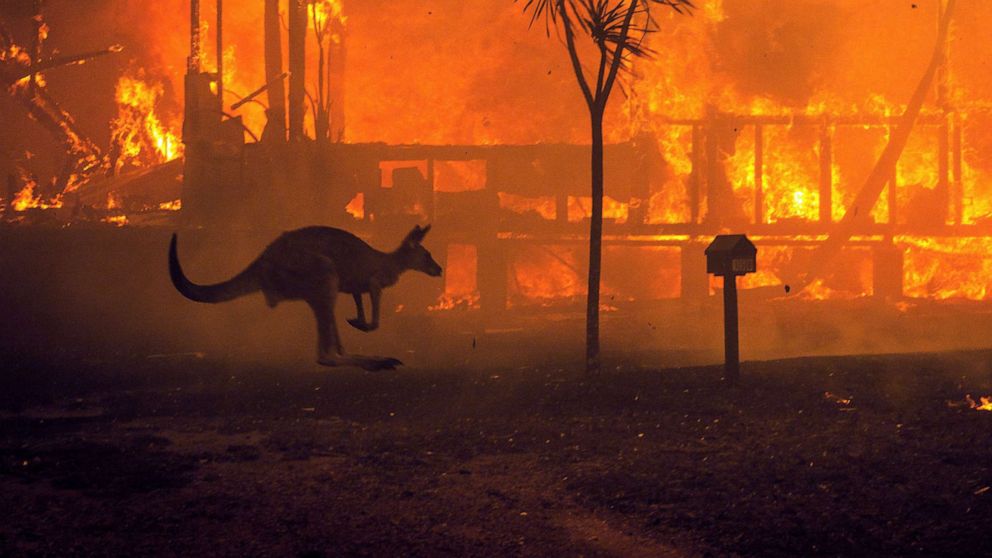Now that the horrific bushfires in Australia have reportedly killed more than 1 billion mammals, birds, and reptiles, the Australian government is denying the massive fire’s link to climate change. Scott Morrison, the prime minister, and his energy and emissions reduction minister, Angus Taylor, have refused to take a meaningful approach in cutting emissions. They have done so even though UN scientists have affirmed the link between climate change and fires and the immense toll on life and the scarring of the once lush forests. This government’s willful ignorance has cost Australia many lives and will cost the world many more unless there is powerful opposition around the world to Morrison, Trump, and the climate denialists.
The Suffering Faced by Nonhuman Animals
A report on the fires has found that over 1 billion animals had been burned alive in the Australian forests. Many scientists believe that of those 1 billion, many are likely undiscovered species that are now extinct. A great number of animals have also been injured, faced with painful burns, and now have little home to return to.
Images have surfaced of charred bodies of kangaroo joeys, some of them caught in fences. Others were too slow, or their mothers were forced to leave them behind. But these innocent creatures perished not because of their own weakness, but because of the concerted detachment of the perpetrators of their murder, the bourgeois class and capitalist governments that has have resisted tackling the root cause of the massive fires: climate change resulting from fossil fuel emissions. The Australian government’s resistance to take a more ambitious approach in cutting emissions is the jadedness that allowed a fire of this magnitude to develop—making them responsible for the substantial damage brought about.
Feigned Ignorance
Despite a three-year drought that preceded these historically massive fires, Scott Morrison and Angus Taylor refuse to acknowledge the link between climate change and the fires. They have gone as far as to argue that they deserve accolades for meeting their goal of emission cuts by 2020. In the prime minister’s latest interview, the most he would commit to was an “open inquiry” into the fires, but he has failed to suggest significant changes in economic policies that influence climate change.
Although the Australian government has met its emissions targets, doing so has failed to make a major difference in combating climate change (indicating that greater action is necessary in curbing more tragedies). UN scientists have repeatedly confirmed that larger fires result from higher temperatures. Australia has seen record high temperatures in 2019. The link between climate change and the fires consuming Australia’s wildlife is undeniable.
Pollution and the Australian Economy
The Australian government has made it clear that protecting private profit is why it is reluctant to really help curb climate change. Australia is the largest exporter of liquid natural gas in the world and a major exporter of coal. Only surpassed by the United States, Australia also produces the most carbon emissions in the world per capita. Cutting emissions to the degree necessary to address global warming and prevent further climate disaster would require drastic changes in the practices of Australia’s big businesses, especially in its oil and coal industries; such changes, however, would undoubtedly impede profits, directly challenging the material interest of Australian corporations.
On December 31, Taylor said that “in most countries, it isn’t acceptable to pursue emission reduction policies that add substantially to the cost of living, destroy jobs and impede growth.” But he did not explain how these policies would hurt the Australian people. Perhaps they believe they will be forced to pay higher taxes and that businesses will be forced to raise taxes on specific products. Framing it this way, however, portrays the Australian government as practicing altruistic restraint that is beneficial for people. But working people don’t need to be taxed. Though it isn’t enough to fully address the issue, a step could be to tax and regulate the corporations responsible, such as the liquid gas corporations. The government won’t do that, however, because of its fixation on these companies’ growth, even if their growth correlates with raising temperatures and massive fires.
Establishing strict emissions reductions would indeed cut into the profits of Australia’s largest fossil fuel companies. But it is entirely cynical to say that these measures would hurt the Australian people. To the contrary, this is the only way to avoid even more deadly and destructive fires, droughts and heat waves, which hit Australia’s workers, poor and indigenous people hardest. Major emissions reductions can be done without raising taxes on Australia’s working class. Heavy taxes on the country’s richest and the nationalization of the fossil fuel companies would generate the resources needed to drastically cut emissions. This would also allow a rapid transition to renewable energy and for the provision of free or low-cost energy to Australia’s people. Indeed, many Australians have argued the current lack of regulation has only increased their energy bills.
The resistance to a more aggressive cut in emissions also elucidates the shortsighted nature of capitalist governments, which would rather prioritize liquid gas exportation and the “growth” it brings. The capitalist government will defend those profits even if the corporate profits come at the cost of a billion animals burned alive, agonizing droughts in the country and abroad, and leave Australians struggling to pay their energy bills. And though the UN is aware of the dangers of this profoundly neglectful behavior, the U.S.-dominated entity will do little force the Australian government to change course.
The Shortsightedness of Capitalism and How We Survive
The fires aren’t simply an unfortunate event that these animals were victims of. This was a tragedy that could have been avoided if combating climate change and sustaining life on earth were a priority in this society. Under capitalism, however, sustaining life is seen as an unnecessary cost and the planet is seen as just another resource to exploit—making these tragedies inevitable as long as this system is maintained.
Capitalist governments, by their nature, are geared to maintaining capitalism. This is evidenced by their open reluctance to abandon these deleterious economic practices and the permission granted to them by their bourgeois overseers. The results are experienced every day by not only humans, but also animals and nature.
The massive bushfires are both a manifestation of capitalist destruction and a reminder that capitalism is the harbinger of agony and the demise of more than just human life. In the face of the latest events in Australia, it is imperative that working people take matters into their own hands and stop waiting for bourgeois governments to do right by them. Working people must destroy capitalism and create a socialist government that is founded on the basis of worker, environmental and animal solidarity, a system geared toward sustaining life, not exploiting it.
As this article is being written, hundreds of thousands of Australians are taking to the streets to protest the government’s resistance to combating climate change. As the fires raged, people took to the forests to rescue koalas—putting them in their cars or giving the thirsty animals water. The energy, the fervor and the anger of the people is palpable, and it is spilling over to the asphalt. Now, while time is of the essence, it is paramount that concerted efforts be made to destroy capitalism and the governments that defend it. With the people’s anger at a swell and the devastation of capitalism traumatizing new generations of young adults, a revolution is more than possible.











